#robert kanigel
Text
National Mathematics Day 2022: On Srinivasa Ramanujan's birth anniversary, know facts & significance

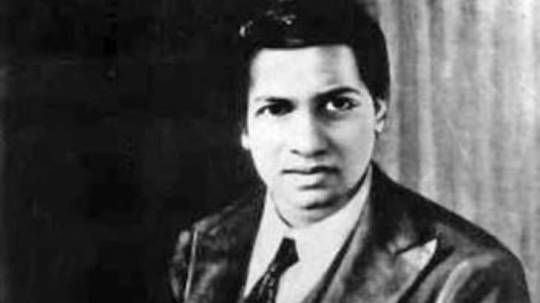
Image Source : TWITTER/@SAMDASTWEETS Srinivasa Ramanujan
National Mathematics Day 2022: India is celebrating National Mathematics Day today to commemorate the 145th birth anniversary of ace mathematician Srinivas Ramanujan who was born on December 22, 1887. In 2012, then Prime Minister Manmohan Singh declared December 22 as National Mathematics Day to honor the life and achievements of Ramanujan. Considered one of the greatest mathematicians of the 20th century, Ramanujan is known for his contributions to number theory and mathematical analysis.
Here's all you need to know about the day, and Ramanujan:
- Srinivas Ramanujan was born on December 22, 1887, at Erode, Tamil Nadu in a Tamil Brahmin Iyengar family. He had developed a liking for mathematics at a very young age. After mastering trigonometry at 12, he was eligible for a scholarship at the Government Arts College in Kumbakonam.
- His excellence in Mathematics was recognized after he started working as a clerk in the Madras Port Trust in 1912, then he was referred to Professor GH Hardy of Trinity College, Cambridge University.
- Ramanujan received a Bachelor of Science (BSc) degree from Trinity College in 1916.
- He was elected to the London Mathematical Society in 1917. Next year, he was elected to the prestigious Royal Society for his research on Elliptic Functions and theory of numbers next year.
- In 1918, he became the first Indian to be elected a Fellow of Trinity College. In 1919 he returned back to India.
- A year later, on April 26, he breathed his last owing to deteriorating health. He was just 32 years old. His biography ‘The Man Who Knew Infinity’ by Robert Kanigel depicts his life and journey to fame.
- Ramanujan his own theorems and independently compiled 3900 results.
- In 2012, then Prime Minister Manmohan Singh declared December 22 as National Mathematics Day to honor Srinivas Ramanujan.
- A film of the same name was released in 2015 in which Dev Patel played Ramanujan. The film shed light on Ramanujan’s childhood in India, his career in Britain, and his journey to becoming a great mathematician.
Read More Lifestyle News
#National #Mathematics #Day #Srinivasa #Ramanujans #birth #anniversary #facts #significance
Read the full article
0 notes
Text
One of the best thing that ever exist is friendship. I don't know how this world will operate without kindness and love from someone you're not intimately attracted with but unconditionally in love. Things might have been different but it's not that you can predicts things. Destiny is still the ruler. I love how it always portray that scientists do not believe in God because that's the beauty of diversity in cultures and belief, the beauty of respect and acceptance and the beauty of living in this world. Ramanujan must have been given a talent and intelligence that anyone could think impossible but because he believed on what he's believing, he pursued his own dreams and did whatever it takes to share his part. Mr. Hardy and Littlewood are our great friends who just made me cry, made number 1729 meaningful than I could ever imagined. The wife and the mother who patiently waited for him. This film, though didn't cater how every equations went. I just want to say that it is for the good of all, jk. Because even if they'll tell it to us we won't understand haha. Math complicate matters but it's helpful to those who want to learn.
The Man Who Knew Infinity (2013)
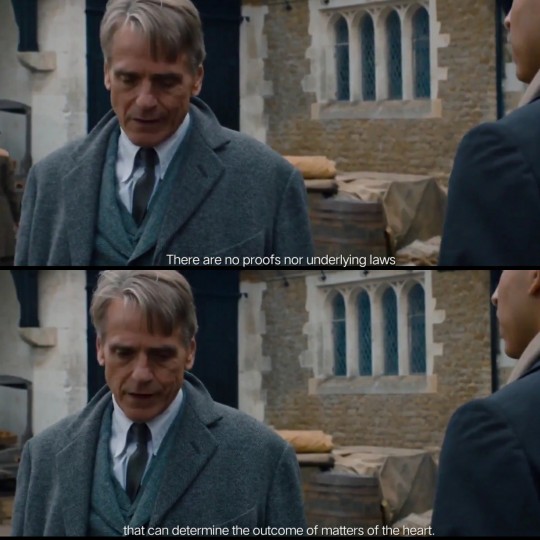

#the man who knew infinity#dev patel#srinivasa ramanujan#biopic#biography#matthew brown#jeremy irons#devika bhise#toby jones#robert kanigel#mathematician#history#drama#tuberculosis#university of cambridge#indian mathematician#india#indian
8 notes
·
View notes
Text
Plenty of mathematicians, Hardy knew, could follow a step-by-step discursus unflaggingly—yet counted for nothing beside Ramanujan. Years later, he would contrive an informal scale of natural mathematical ability on which he assigned himself a 25 and Littlewood a 30. To David Hilbert, the most eminent mathematician of the day, he assigned an 80. To Ramanujan he gave 100. - Robert Kanigel
6 notes
·
View notes
Link
Hearing Homer's Song: The Brief Life and Big Idea of Milman Parry by Robert Kanigel https://amzn.to/3u4VHWV
https://bookshop.org/a/17891/9780525520948
#Hearing Homer's Song: The Brief Life and Big Idea of Milman Parry#Milman Parry#Homer#Robert Kanigel#biography#biograhy books#the classics#greek myth poetry#books#book review
1 note
·
View note
Quote
Pi is not merely the ubiquitous factor in high school geometry problems; it is stitched across the whole tapestry of mathematics, not just geometry's little corner of it. Pi occupies a key place in trigonometry too. It is intimately related to e, and to imaginary numbers. Pi even shows up in the mathematics of probability.
Robert Kanigel
2 notes
·
View notes
Photo
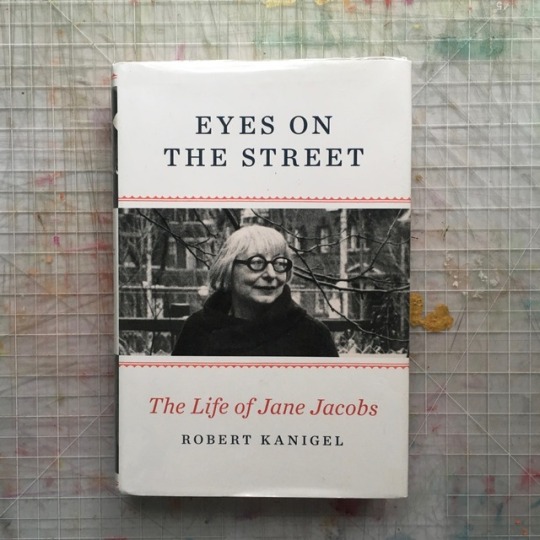
135 / Eyes on the Street: The Life of Jane Jacobs by Robert Kanigel (2016) 496 pg
The first major biography of the irrepressible woman who changed the way we view and live in cities, and whose influence can still be felt in any discussion of urban planning to this day.
Eyes on the Street is a revelation of the phenomenal woman who raised three children, wrote seven groundbreaking books, saved neighborhoods, stopped expressways, was arrested twice, and engaged at home and on the streets in thousands of debates - all of which she won. Here is the child who challenged her third-grade teacher; the high school poet; the journalist who honed her writing skills at Iron Age, Architectural Forum, Fortune, and other outlets while amassing the knowledge she would draw upon to write her most famous book, The Death and Life of Great American Cities. Here, too, is the activist who helped lead an ultimately successful protest against Robert Moses' proposed expressway through her beloved Greenwich Village and who, in order to keep her sons out of the Vietnam War, moved to Canada, where she became as well known and admired as she was in the United States.
1 note
·
View note
Note
What are your top 5 fiction and nonfiction books of all time? ☺️
You just had to ask, didn't you?
I'm surprised choosing my top 5 fiction turned out to be more difficult than choosing my top 5 nonfiction, so I divided fiction into two distinct parts.
Fiction (non classics)
Mara, Daughter of the Nile by Eloise Jarvis McGraw
The Traitor Baru Cormorant (series) by Seth Dickinson
Gilead by Marilynne Robinson
The Secret Commonwealth by Phillip Pullman
The Just City by Jo Walton
Honorable Mentions
The Signature of All Things by Elizabeth Gilbert
Wolf Hall/Bring Up the Bodies by Hilary Mantel
Fiction (classics)
Jane Eyre by Charlotte Bronte
Mansfield Park by Jane Austen
Much Ado About Nothing by William Shakespeare
Anna Karenina by Leo Tolstoy
Beloved by Toni Morrison
Honorable Mentions
Crime & Punishment by Fyodor Doestovsky
The Stranger by Albert Camus
The Plague by Albert Camus
Antigone by Sophocles
The Wee Free Men (series) by Terry Pratchett
Nonfiction
The Road to Character by David Brooks
At the Existentialist Cafe by Sarah Bakewell
The Signal and the Noise by Nate Silver
The Monarchy of Fear by Martha Nussbaum
Mountains Beyond Mountains by Tracy Kidder
Honorable Mentions
Prime Obsessions by John Derbyshire
Sync by Steven Strogatz
Henry David Thoreau: A Life by Laura Dassow Walls
The Republic by Plato
Figuring by Maria Popova
The Man Who Knew Infinity by Robert Kanigel
Leadership in Turbulent Times by Doris Kearns Goodwin
15 notes
·
View notes
Text
Cork in Verse | Ana Spehar interviews Theo Dorgan
Cork in Verse is a series of interviews by Ana Spehar with Cork Poets. This week Ana interviews Theo Dorgan.
Born in Cork, Theo Dorgan is a poet, and also a novelist, prose writer, translator, librettist, editor and documentary screenwriter. His most recent publications are Orpheus (Dedalus Press, 2018), Bailéid Giofógacha (translation into Irish of Lorca’s Romancero Gitano, Coiscéim 2019), and THE ABDUCTION, his translation from the French of Syrian poet Maram al-Masri’s Le Rapt, Southword editions, 2020). He is a member of Aosdána.
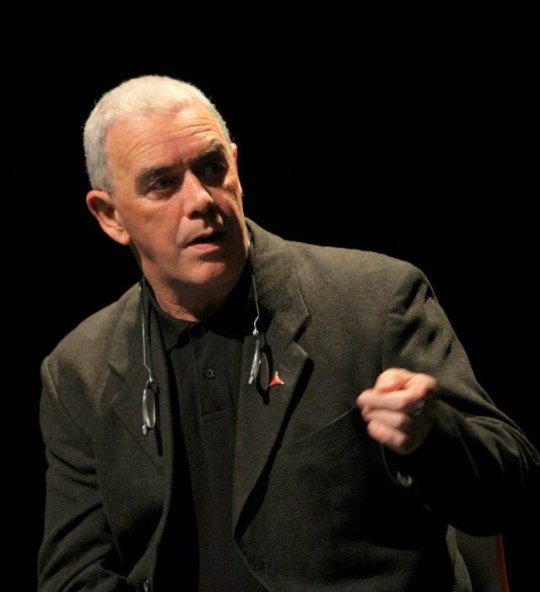
When did you start writing poetry?
The first poem I was given came to me on a winter’s night when I was, what, 19 or so? I’d arranged to meet a young woman at a céilí in Muiríoch,and on the long night walk there from Baile an Fheirtéaraigh I found myself writing her a poem. I’d had it in mind always that I would spend my life as a writer but had assumed it would be prose. That first visitation changed everything.
Could you tell us more about your creative process? How often do you write?
I try to write when the poem strikes. I believe, I know from a lifetime’s experience, that it’s truer to say that we don’t write the poem, the poem writes us. Of course, when that first flash has been captured, to the extent that it has been, there then comes the long working to secure it on the page. That’s where the craft comes in, the famous 10,000 hours.
I might go months without writing anything at all, and then there might come a rush, or just a stray poem. There’s no accounting for this, it can’t be pre-ordained. I am occasionally commissioned to write something, but if I accept, I always make it clear that I will withdraw from the commission unless a poem strikes. Too, I won’t accept a commission unless I have some sense that it chimes with something that’s been hovering somewhere in the back of my mind. That’s no guarantee, of course, that the preoccupation will crystallise in a poem, but it has happened.
Who is your favourite author/authors?
Impossible to answer, there are so many writers and poets with whom I have an ongoing affinity. That said, I come back time and again to Robert Graves, and to Cavafy, Gary Snyder, Heaney, Boland and — always new to me — Paula Meehan.
What are you reading at the moment?
Robert Kanigel’s Hearing Homer’s Song, his life of the scholar Milman Parry who revolutionised Homer studies, and Martin Gayford’s new book about David Hockney, Spring Cannot Be Cancelled. Of course, at the same time, day in and day out, I am dipping into all kinds of books constantly, revisiting old friends, chasing references or stray correspondences.
What advice would you give to someone just starting their creative journey in writing?
Read, read and read. It’s an inherited craft, you have to immerse yourself in the tradition. Search out writers with whom you feel an affinity and ask yourself why that is. Search out writers who repel you and ask yourself why they have that effect on you. Learn to be friends with and nurture your own sensibility but give it a hard time. When you come across a poem that moves you, that lights you up inside, stand back and ask yourself, how does she do that? A poem, or story, or novel or play will find you if it’s for you — you need to be prepared in the craft if you’re to get it down. On the other side of the business, never refuse anything that suggests itself to you, write it down; it will work out or it won’t, but never attempt to short-circuit the process. Stay out of your own road, and treat all advice, including this advice, with good-humoured scepticism. Be on good terms with your waste basket, real or virtual, but before you bin a poem, check that there isn’t a line or two that can be salvaged — that might be the living line from which something entirely unexpected may announce itself.
The Angel of History
by Theo Dorgan
In the Parliament house on Kildare Street the lamps were burning.
It was a winter night, the usual slant rain falling.
I had paused to light up a cigarette, to watch the lone Guard
stamp her feet, blow uselessly into her cupped, gloved hands.
In the colonnade of the National Library a man was standing,
a man neither old nor young, his head bare, half turned towards
the lights in the Parliament house, the high blank windows.
I saw him reach inside his long loose coat, take out a notebook.
I crossed the road, gathering my own long coat around me,
stood in behind him, looked over his shoulder. He paid no heed.
One after another I saw him strike them out from a long list of names:
Senators, Deputies, Ministers . One after another the names
dissolved on the page, a scant dozen remaining. I watched him
ink in a question mark after each of these, neat and precise.
He put the book away, sliding it down carefully into a deep pocket;
he turned and looked at me, nothing like pity in those hollow eyes.
He sighed, then squared his shoulders, lifted his face to the rain
and was gone. Gone as if he had never been. But I saw him,
I know who he was, I witnessed that cold, exact cancellation;
walked on, walked home, thoughtful, afraid for my country.
A Nocturne For Blackpool
by Theo Dorgan
Dolphins are coursing in the blue air outside the window
and the sparking stars are oxygen, bubbling to the moon.
At the end of a terrace, unicorns scuff asphalt,
one with her neck stretched on the cool roof of a car.
A key rasps in the latch, milk bottles click on a sill,
a truck heading for Mallow roars, changing gear on a hill.
The electric hum of the brewery whines, then drops in pitch –
ground bass for the nocturne of Blackpool.
The ghost of Inspector Swanzy creeps down Hardwick Street,
MacCurtain turns down the counterpane of a bed he’ll never sleep in,
unquiet murmurs scold from the blue-slate rooftops
the Death-Squad no-one had thought to guard against.
The young sunburned hurlers flex in their beds, dreaming of glory,
great deeds on the playing fields, half-days from school,
while their slightly older sisters dream of men and pain,
an equation to be puzzled out again and again.
Walloo Dullea, homeward bound on the Commons Road, belts out airs from Trovatore,
the recipe as before, nobody stirs from sleep
and ‘Puzzle the Judge’, contented, pokes at ashes –
“There’s many a lawyer here today could learn from this man”.
North Chapel, The Assumption, Farranferris and Blackpool,
the mass of the church in stone rears like rock from the sea
but the interlaced lanes flick with submarine life
older than priests can, or want to, understand.
This woman believed Jack Lynch stood next to God, who broke the
Republic.
This man beyond, his face turned to the wall, stares at his friend
whose face will not cease from burning in the icy sea – torpedoed off
Murmansk from a tanker. He shot him, now nightly he watches him sink.
(Cont. with stanza break)
Here is a woman the wrong side of forty, sightless in her kitchen
as she struggles to make sense of the redundancy notice,
of her boorish son, just home, four years on the dole, foul-mouthed,
of her husband, who has aged ten years in as many days.
The bells of Shandon jolt like electricity through lovers
in a cold-water flat beneath the attic of a house in Hatton’s Alley,
the ghost of Frank O’Connor smiles on Fever Hospital Steps
as Mon boys go by, arguing about first pints of stout and Che Guevara.
The unicorns of legend are the donkeys of childhood, nobody
knows that better than we know it ourselves, but we know also that
dolphins are coursing through the blue air outside our windows
and the sparking stars are oxygen, bubbling to the moon.
We are who we are and what we do. We study indifference in a hard
school
and in a hard time, but we keep the skill to make legend of the ordinary.
We keep an eye on the slow clock of history in Blackpool –
Jesus himself, as they say around here, was born in a stable.
for Mick Hannigan
1 note
·
View note
Photo

We at Penguin would like to congratulate our very own Beena Kamlani on her thirtieth anniversary at Viking/Penguin! Beena, editor, teacher, mentor, and friend—only some of the titles she’s earned throughout her storied career—is a brilliant, inimitable force in the publishing industry, and we’re so proud to be celebrating this milestone with her!
Beena has edited authors such as Blanche Wiesen Cook, Terry McMillan, Diane Middlebrook, Sir Peter Medawar, Simone Beck, David Leavitt, Jiang Rong, Paul Beatty, Robert Kanigel, Reinaldo Arenas, Bob Shacochis, Alex Gilvarry, Kristopher Jansma, and Saul Bellow, and worked with Robert Fagles on his masterly translations of The Odyssey, The Iliad, and The Aeneid. She taught book editing at NYU for eighteen years, winning an award for teaching excellence during that time, and now teaches self-editing at Hunter College, CUNY. Read her anniversary speech about her publishing journey, her love of editing, and the importance of books below:
***
Thanks to Kathryn and Michael for hosting this evening and to all my colleagues, new and old, for making it. I’ll keep this brief. No amount of words can describe what these thirty years have meant to me—from the many interesting personalities who’ve crossed my path, to the books, the hundreds of books, that became part of my waking life. And it’s gone so fast. Blink, there’s ten years. Blink again, another ten, or twenty.
When my niece was five, she asked me why I read so many books. I said, because when I read a book, I live another life. It’s true also of being an editor. Through the books we edit, we inhabit our authors’ characters and stories, and their lives, their ups and downs, intersect with ours. That multiplicity of experience, compressed and lived so many times, is also why time tends to go by so fast. It is a job unlike any other, because it is rooted in the successful management of dialogue, of communication, of ensuring that what you and the author have to say to each other will end up revitalizing and not jeopardizing the work. It relies on sensitivity and diplomacy, humor and skill. It is always poised on the razor edge of friendship and professionalism. In the end the book must be served, and we are all in its service.
I came to Viking back in 1988; it was a small company then and housed all of us, and the mailroom, in two floors on 40 West 23rd Street, home to the Home Depot now. In the thirty years I’ve been here, the company has grown to become the largest book publisher in the world. It’s been quite an arc, and it’s been a privilege to be part of that growth, to see it go from strength to strength. The company has always been a magnet for talent and it has nurtured it well. A company is its people and if longevity is a marker of its ability to draw and sustain talent, here alone is evidence of it. As I look around this room, I see people with even longer histories here than mine. Kathryn, Leigh, Paul, Hal … It’s been such an honour to learn from all those who came before me, and a true pleasure to pass on what one’s learnt to those who have come after me.
For me personally, that arc began with the legendary Peter Mayer, who had just brought Bellow back to Viking the year I joined. It was a bright celebratory moment in Viking’s history. His booming voice filled our corridors and his energy was infectious. We began growing steadily as a company, becoming larger by the minute. I began working with Bellow from his first offering to us, A Theft, until his last novel, Ravelstein. Kathryn and I first worked together when Bob’s Iliad was delivered to the house in 1988. We continued working with him, completing his trifecta—the Iliad, the Odyssey, and Virgil’s Aeneid—and our collaboration with him led to a friendship that continued until his death in 2008. There have been so many others—team efforts with Andrea, Pam, Wendy, Carole-- each one a landmark on the way.
This fabulous journey would not have been what it has without all of you, my wonderful colleagues. Working with you has been a joy. We’ve all been on this road together, a team devoted to making the best books possible. I look forward to continuing the journey with all my newer colleagues—Brian, Elda, John, Patrick, all of you. I am as excited about what’s to come as I was thirty years ago when I first walked in through Viking’s doors. And to Kathryn, who has been a friend, a mentor, and an inspiration since I joined, I can only say thanks, and thanks, and ever thanks for being there from the beginning and for bringing us all together this evening.
53 notes
·
View notes
Text
D0WNL0AD READ FULL The Man Who Knew Infinity: A Life of the Genius Ramanujan by Robert Kanigel [PDF EBOOK EPUB KINDLE]
D0WNL0AD READ FULL The Man Who Knew Infinity: A Life of the Genius Ramanujan by Robert Kanigel [PDF EBOOK EPUB KINDLE]

Read Download Online Free Now "The Man Who Knew Infinity: A Life of the Genius Ramanujan"
Read Full Book Here
https://starrymedialibrary.blogspot.com/media70.php?asin=1476763496
Size: 16,557 KB D0wnl0ad URL => https://starrymedialibrary.blogspot.com/media25.php?asin=1476763496 - D0WNL0AD PDF Ebook Textbook The Man Who Knew Infinity: A Life of the Genius Ramanujan by Robert Kanigel
Last access: 45098 user
Last server checked: 15 Minutes ago!
The Man Who Knew Infinity: A Life of the Genius Ramanujan by Robert Kanigel [PDF EBOOK EPUB MOBI Kindle]
The Man Who Knew Infinity: A Life of the Genius Ramanujan by Robert Kanigel pdf d0wnl0ad
The Man Who Knew Infinity: A Life of the Genius Ramanujan by Robert Kanigel read online
Robert Kanigel by The Man Who Knew Infinity: A Life of the Genius Ramanujan epub
The Man Who Knew Infinity: A Life of the Genius Ramanujan by Robert Kanigel vk
The Man Who Knew Infinity: A Life of the Genius Ramanujan by Robert Kanigel pdf d0wnl0ad free
The Man Who Knew Infinity: A Life of the Genius Ramanujan by Robert Kanigel d0wnl0ad ebook
The Man Who Knew Infinity: A Life of the Genius Ramanujan pdf
The Man Who Knew Infinity: A Life of the Genius Ramanujan by Robert Kanigel amazon
The Man Who Knew Infinity: A Life of the Genius Ramanujan by Robert Kanigel free d0wnl0ad pdf
The Man Who Knew Infinity: A Life of the Genius Ramanujan by Robert Kanigel pdf free
The Man Who Knew Infinity: A Life of the Genius Ramanujan by Robert Kanigel pdf
The Man Who Knew Infinity: A Life of the Genius Ramanujan by Robert Kanigel epub d0wnl0ad
The Man Who Knew Infinity: A Life of the Genius Ramanujan by Robert Kanigel online
Robert Kanigel by The Man Who Knew Infinity: A Life of the Genius Ramanujan epub d0wnl0ad
The Man Who Knew Infinity: A Life of the Genius Ramanujan by Robert Kanigel epub vk
The Man Who Knew Infinity: A Life of the Genius Ramanujan by Robert Kanigel mobi
d0wnl0ad The Man Who Knew Infinity: A Life of the Genius Ramanujan PDF - KINDLE - EPUB - MOBI
The Man Who Knew Infinity: A Life of the Genius Ramanujan d0wnl0ad ebook PDF EPUB, book in english language
[d0wnl0ad] book The Man Who Knew Infinity: A Life of the Genius Ramanujan in format PDF
[PDF] [EPUB] The Man Who Knew Infinity: A Life of the Genius Ramanujan by Robert Kanigel d0wnl0ad
synopsis of The Man Who Knew Infinity: A Life of the Genius Ramanujan by Robert Kanigel
review online The Man Who Knew Infinity: A Life of the Genius Ramanujan by Robert Kanigel
The Man Who Knew Infinity: A Life of the Genius Ramanujan Robert Kanigel pdf download
The Man Who Knew Infinity: A Life of the Genius Ramanujan Robert Kanigel read online
Robert Kanigel The Man Who Knew Infinity: A Life of the Genius Ramanujan epub
The Man Who Knew Infinity: A Life of the Genius Ramanujan Robert Kanigel vk
The Man Who Knew Infinity: A Life of the Genius Ramanujan Robert Kanigel amazon
The Man Who Knew Infinity: A Life of the Genius Ramanujan Robert Kanigel free download pdf
The Man Who Knew Infinity: A Life of the Genius Ramanujan Robert Kanigel pdf free
The Man Who Knew Infinity: A Life of the Genius Ramanujan pdf Robert Kanigel
The Man Who Knew Infinity: A Life of the Genius Ramanujan Robert Kanigel epub download
The Man Who Knew Infinity: A Life of the Genius Ramanujan Robert Kanigel online
Robert Kanigel The Man Who Knew Infinity: A Life of the Genius Ramanujan epub download
The Man Who Knew Infinity: A Life of the Genius Ramanujan Robert Kanigel epub vk
The Man Who Knew Infinity: A Life of the Genius Ramanujan Robert Kanigel mobi
download The Man Who Knew Infinity: A Life of the Genius Ramanujan PDF - KINDLE - EPUB - MOBI
The Man Who Knew Infinity: A Life of the Genius Ramanujan download ebook PDF EPUB, book in english language
[download] book The Man Who Knew Infinity: A Life of the Genius Ramanujan in format PDF
The Man Who Knew Infinity: A Life of the Genius Ramanujan download free of book in format
Robert Kanigel The Man Who Knew Infinity: A Life of the Genius Ramanujan epub vk
The Man Who Knew Infinity: A Life of the Genius Ramanujan Robert Kanigel PDF
The Man Who Knew Infinity: A Life of the Genius Ramanujan Robert Kanigel ePub
The Man Who Knew Infinity: A Life of the Genius Ramanujan Robert Kanigel DOC
The Man Who Knew Infinity: A Life of the Genius Ramanujan Robert Kanigel RTF
The Man Who Knew Infinity: A Life of the Genius Ramanujan Robert Kanigel WORD
The Man Who Knew Infinity: A Life of the Genius Ramanujan Robert Kanigel PPT
The Man Who Knew Infinity: A Life of the Genius Ramanujan Robert Kanigel TXT
The Man Who Knew Infinity: A Life of the Genius Ramanujan Robert Kanigel Ebook
The Man Who Knew Infinity: A Life of the Genius Ramanujan Robert Kanigel iBooks
The Man Who Knew Infinity: A Life of the Genius Ramanujan Robert Kanigel Kindle
The Man Who Knew Infinity: A Life of the Genius Ramanujan Robert Kanigel Rar
The Man Who Knew Infinity: A Life of the Genius Ramanujan Robert Kanigel Zip
The Man Who Knew Infinity: A Life of the Genius Ramanujan Robert Kanigel Mobipocket
The Man Who Knew Infinity: A Life of the Genius Ramanujan Robert Kanigel Mobi Online
The Man Who Knew Infinity: A Life of the Genius Ramanujan Robert Kanigel Audiobook Online
The Man Who Knew Infinity: A Life of the Genius Ramanujan Robert Kanigel Review Online
The Man Who Knew Infinity: A Life of the Genius Ramanujan Robert Kanigel Read Online
The Man Who Knew Infinity: A Life of the Genius Ramanujan Robert Kanigel Download Online
D0WNL0AD PDF Ebook Textbook The Man Who Knew Infinity: A Life of the Genius Ramanujan by Robert Kanigel
D0wnl0ad URL >> https://starrymedialibrary.blogspot.com/media39.php?asin=1476763496
That's all information about The Man Who Knew Infinity: A Life of the Genius Ramanujan by Robert Kanigel. Thank you.
0 notes
Link
From the introduction:
Henry Whitehead reportedly [according to his student Graham Higman] said, “Combinatorics is the slums of topology”. This prejudice, the view that combinatorics is quite different from ‘real mathematics’, was not uncommon in the twentieth century, among popular expositors as well as professionals. In his biography of Srinivasa Ramanujan, Robert Kanigel describes Percy MacMahon in these terms:
[MacMahon’s] expertise lay in combinatorics, a sort of glorified dice- throwing, and in it he had made contributions original enough to be named a Fellow of the Royal Society.
In the later part of the century, attitudes changed. [...] In this chapter, I have attempted to tease apart some of the interrelated reasons for this change, and perhaps to throw some light on present trends and future directions.
#math#maths#mathematics#mathema#combinatorics#community#i'm sorry i don't have more to offer right now#the semester is being very heavy to me atm#stealing other people's content
5 notes
·
View notes
Text
Robert Kanigel
The Man Who Knew Infinity: A Life of the Genius Ramanujan (2016)
(F 02.08.2019): Nite nite 😴💤🎴
& Sweet dreams 😜🦄🖖
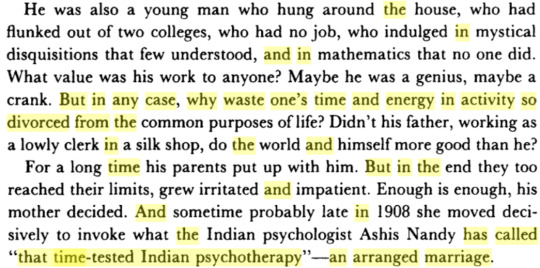
0 notes
Photo
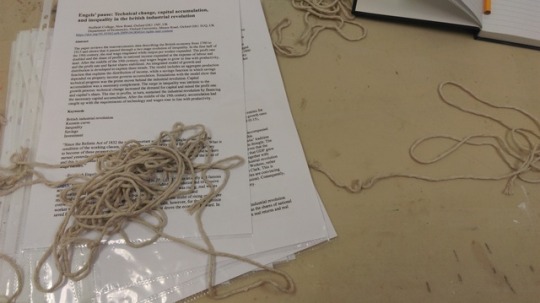

Research and Development
Task 2: Following a tutorial, I began an exercise in visual documentation, as an investigation into withheld information (material cover-ups). This stemmed from theories surrounding Henry Ford’s production line innovation. Engels’ pause:Technical change, capital accumulation, and inequality in the British industrial revolution by Robert C. Allen, was an article discovered and utilized within the piece due to it’s content (however impenetrable); graphs, fig.s, and memorandum vernacular.

The document was suspended with string, against the black background, creating a stark, monochromatic orientation. My research continued in the discovery of The One Best Way, by Frederick Winslow Taylor. My reading was the focus of the practical investigation - sardonic in an approach to the literature, as a way of reinforcing my questioning of current human capital and the value of labour.

Documentation/planning continues as a process, as shown in the image above, of further Plastic wallet workings, in which I endeavour to create a precise document, whereby I replace I AM MANUSCRIPT repetitions with an alternative language - namely blocked out sections of horizontal and diagonal lines, Once again (reoccurring like repetition in my work) failure occurs. This is an element of my practice which is often celebrated, and one which concludes the action upon that piece, often indefinitely. The plastic wallet was positioned within the studio space, exploring the idea of value.
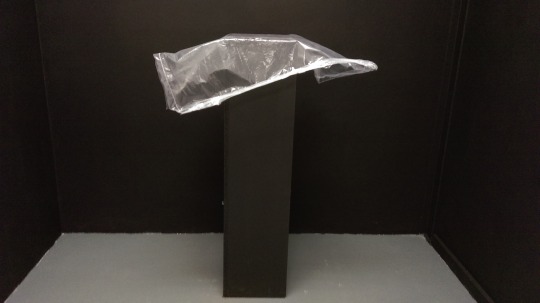



Reference list
Kanigel, R. (2005). The One Best Way: Frederick Winslow Taylor and the Enigma of Efficiency: Frederick Wilson Taylor and the Enigma of Efficiency (New Edition ed.). Massachusetts: MIT Press
Allen, R.C. (2008). Engels’ pause: Technical change, capital accumulation, and inequality in the british industrial revolution. Explorations in Economic History. n/g (n/g), 1-4
1 note
·
View note
Link
Ginia Bellafante digs into Jane Jacobs’ contributions on the eve of a new documentary, Citizen Jane: Battle for the City by Matt Tyrnauer:
Jacobs had a term, “monstrous hybrids,” for the unhealthy partnerships that can arise between governments and big businesses. From the earliest days of his career, Mr. Trump has operated on the precise model that so unnerved her, relying on contacts in state and city government, as the historian Kim Phillips-Fein recalls in her new book, “Fear City: New York’s Fiscal Crisis and the Rise of Austerity Politics.” In the 1970s, in a deal with the Urban Development Corporation, Mr. Trump acquired the Commodore Hotel, near Grand Central Terminal, in exchange for big tax breaks that would extend for decades. In the author’s view, this was the beginning of the end for New York — the beginning, as she puts it, of displacement for working-class New Yorkers as the city sought to save itself from further decline by ingratiating itself to the wealthy, here and abroad. Oligarchs didn’t just arrive on West 57th Street in 2013; they had, in fact, been systematically courted for a very long time.
Although Jacobs was wrong about many things — most significantly in her refusal to imagine race as something that can shake things up in urban life — she was prescient as well, even in her later years, in books that virtually no one reads today. In 2004, for instance, at age 88, she wrote a book called “Dark Age Ahead,” a title she might have borrowed from Stephen K. Bannon’s diary. It was not widely praised, and yet it precisely pinpointed a cavalcade of pernicious social trends — rising rates of inequality, the factionalization arising from globalization, erosion of nuclear family life, the forfeiture of real academic learning for credentialism — that she felt certain would lead us to a grim place. She did not live to see Mr. Trump ascend to the presidency, but as someone who shared his absolute self-certainty, she surely would have said, “I told you so.”
I’ve just ordered a copy of Dark Age Ahead, which I haven’t read in its entirety: I’ve only seen fragments.
Also, Bellafante’s comment about Jacobs ‘refusal to imagine race as something that can shake things up in urban life’ may go too far.
Peter Laurence at Becoming Jane Jacobs wrote about this theme, saying
A recently published biography has contributed to the myth that Jane Jacobs was inattentive to issues of race. A book reviewer in the Literature Review of Canada wrote, "Her inattention to racism, whether in the form of American housing markets or in official policies like redlining, is well known—at least within the academy, and it was noticed before Death and Life was published."
These confidently made assertions are wrong. Similarly, the source of the assertions, author Robert Kanigel's claim in Eyes on the Street that Jacobs believed that discrimination against "Negroes" was little different from those of other slum populations and "that was about it" is incorrect and misleading. In The Death and Life of Great American Cities, Jacobs wrote about segregation, discrimination, and racism, with special attention to African-Americans, on multiple occasions and in various ways. She called racism "our country's most serious social problem" (p. 71). She spoke of Americans' "tendencies toward master-race psychology" (p. 284). She wrote of housing discrimination, noting that "colored citizens are cruelly overcrowded in their shelter and cruelly overcharged for it" (p. 274). She wrote of credit "blacklisting" (aka redlining), the denial of mortgages and business loans (pp. 299–300). In fact, as early as 1945, in a short history of the United States written for foreign readers when she worked at the Office of War Information, she honestly observed, “The nation’s 13,000,000 Negro citizens do not yet have full economic equality and opportunity" (Becoming Jane Jacobs, p. 296). And in Death and Life itself, she explicitly rejected the "Physical Fallacy," when she wrote, "I do not mean to imply that a city’s planning and design, or its types of streets and street life, can automatically overcome segregation and discrimination. Too many other kinds of effort are also required to right these injustices" (pp. 71-72).
10 notes
·
View notes
Text
Book Review: Eyes on the Street—The Life of Jane Jacobs
Book Review: Eyes on the Street—The Life of Jane Jacobs
Eyes on the Street: The Life of Jane Jacobs is the first significant biography of the woman who changed the way many of us view and live in cities. And just like Jacobs and her writing, Robert Kanigel bucks the status-quo and takes a unique approach in telling the back story of the iconoclastic urbanist.
Rather than a staid, scholarly review of Jacobs’ advocacy and writing, Eyes on the Streetpr…
View On WordPress
1 note
·
View note
